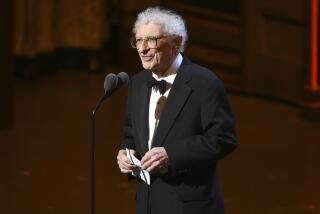New Orleans Saves Connick in Concert
- Share via
Of all the different sides shown by vocalist, jazz pianist, actor and New Orleans product Harry Connick Jr., the one that has gained him the most attention is that of romantic balladeer. His romantic side was just what a sold-out Wiltern Theatre audience had gathered to hear Wednesday as Connick, pushing a new album of original ballads, brought in a jazz combo and a 40-piece string orchestra to play from the new Columbia disc “To See You.”
Surprisingly, Connick earned his most enthusiastic ovations--and there were many--not for the strings-embellished songs of love from the new album but for his rollicking, slightly skewered versions of New Orleans-influenced jazz.
Though the unvarying mood of the album may be perfect for a night in front of the fireplace, it would have been too much of the same come-hither thing during this 90-minute show, and Connick was wise to vary his material and instrumental format during its course. Opening with the orchestra obscured by a gauzy curtain, he sang “Let’s Just Kiss,” “Let Me Love Tonight” and “Once” from the album before bringing out trumpeter Leroy Jones for some up-tempo New Orleans-style fun. And just in time.
Connick, who had much success with the romantic ballads he recorded for “When Harry Met Sally . . . ,” doesn’t write with the same economy and melodicism common to the standards in the great American songbook. The songs moved uneasily through cumbersome progressions, and the lyrics, far from simple, are hardly memorable with their difficult constructions and obscure imagery. The orchestra, making little real contribution, served only as sweetener.
Neither as wistful as Chet Baker’s nor as confident as Frank Sinatra’s, Connick’s voice none the less makes a smooth showing as it slides through a song. His piano playing seemed stifled during these numbers, adding little to the overall mood. Only when joined by Jones, trombonist Lucien Barbarian and baritone player Dave Schumacher did Connick strike up the robust, barrel-house play that first brought him attention.
Connick and the orchestra closed the show with “It Had to Be You,” and that Gus Kahn-Isham Jones standard made his own love songs pale in comparison. Connick may be a master of the romantic mood, but only when doing someone else’s material.
More to Read
The biggest entertainment stories
Get our big stories about Hollywood, film, television, music, arts, culture and more right in your inbox as soon as they publish.
You may occasionally receive promotional content from the Los Angeles Times.






